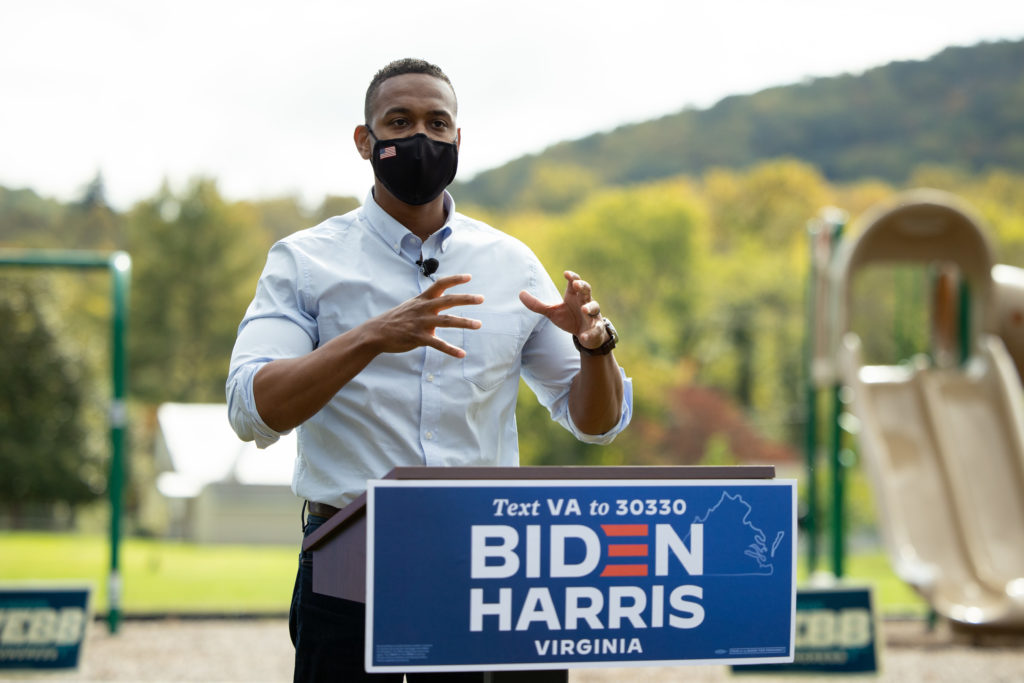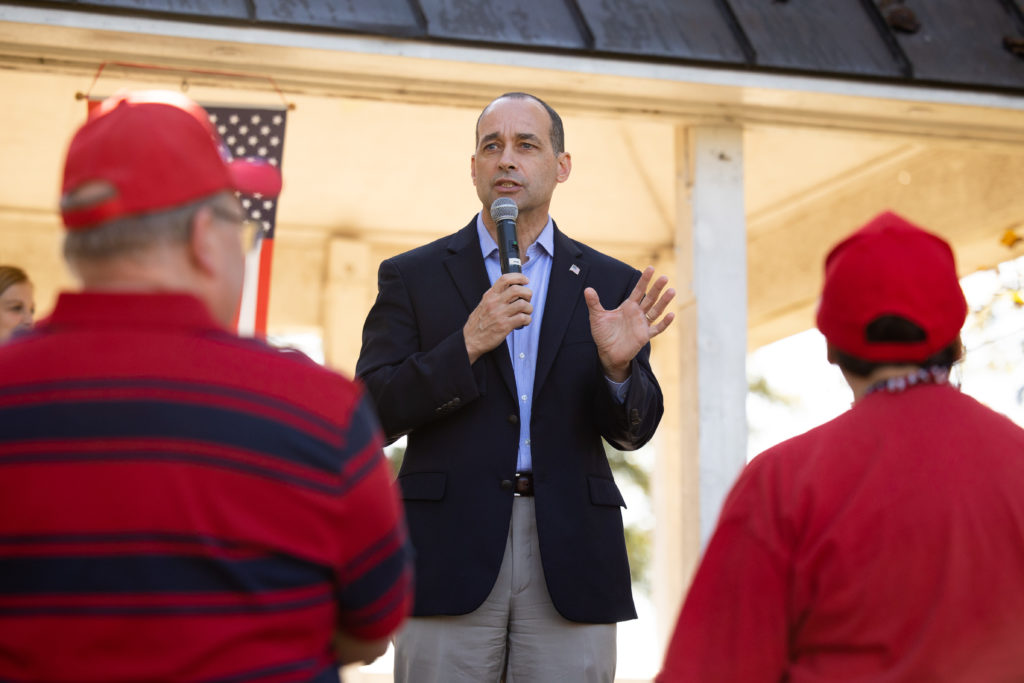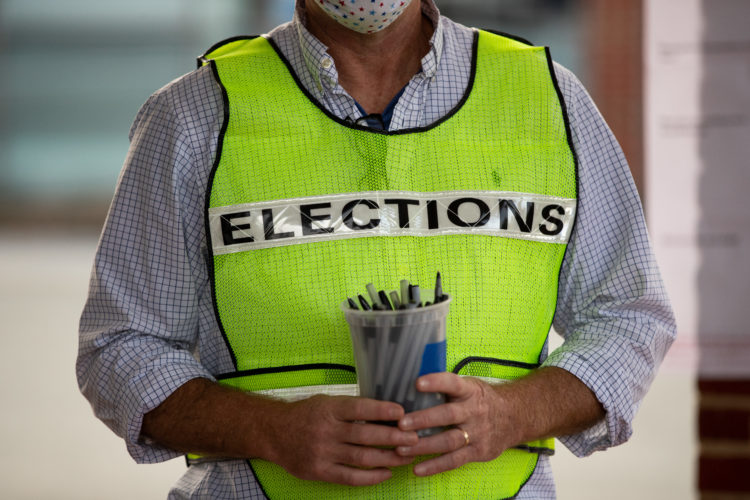A 20-year GOP stronghold continues to ebb and flow
As polling shows Dr. Cameron Webb could flip the 5th Congressional District from Republican to Democrat, it goes beyond Webb and Bob Good as candidates and to the actual shape and demographics of the district itself.
Former Campbell County Supervisor Bob Good, the Republican candidate for the seat in the House of Representatives, said he wants to fight. Webb, the Democratic candidate and director of health policy and equity at the University of Virginia, said he wants to heal.
Which message — and candidate will prevail — remains to be seen, but recent polling indicates Webb could flip the seat blue for the first time in a decade.
Their messages diverge and the demographics of Virginia’s largest congressional district is diverse — featuring a mix of urban and rural localities, various business sectors and agriculture, as well as a solid blend of Democratic and Republican constituents. Having leaned Republican since 2000, recent seat holders have been single-term representatives, and only one Democrat has occupied it in the last two decades.
Polling and reports have labeled the district a “toss up” or placed Webb within the margins of winning. Beyond the differences in the candidates themselves, the 5th District represents an almost microcosm of America.
Amidst a global pandemic, social unrest and a tense presidential race that offers a partisan umbrella to fall under, Good’s campaign uses President Donald Trump’s talking points as Webb’s caters to Democrats while courting moderates across a political spectrum.
Entering an ideological rift
Cook Political Report is among the political entities that recently labeled the 5th District a “toss up.” David Wasserman, a political analyst with Cook, said that a potential Webb victory may echo the last time a Democrat represented the district.
In 2008, Tom Perriello entered the scene as a young, fresh candidate catching a Democratic wave of energy from President Barack Obama’s campaign and student turnout in college towns.
Though various polls show that the presidential election appears to have margins as narrow as the 5th does, the district is shaped differently now, and nationwide politics are more divided than they were then — Wasserman said the division within the Republican Party itself is creating a rift that Webb has spent much of his campaign entering.
Wasserman considers Webb a “unicorn” for this race. Aside from Webb’s campaign strategies, Wasserman notes how his very identity can appeal to a wider range of voters.
“He’s a young African American doctor who’s the son of a [Drug Enforcement Agency] agent and is running ads advertising support from local sheriffs of different races, is married to a physician from the Southside, and is touting in his ads that he is an advisor that has worked for presidents Obama and Trump,” Wasserman explained. “So that’s a good message in the 5th District considering that it voted for Trump in 2016.”

Congressional candidate Dr. Cameron Webb speaks to a crowd of supporters in Charlottesville.
Credit: Mike Kropf / Charlottesville Tomorrow
Webb, a medical doctor who also has a law degree and is University of Virginia’s director of health policy and equity, has already spent some time in the nation’s capital. In 2016 and 2017, he served a White House fellowship spanning the end of the Obama administration and the beginning of Trump’s.
Wasserman explained how Webb’s candidacy is also happening at a time where the Republican Party within the district appears to be “fractured.” He noted how incumbent representative, Denver Riggleman, was ousted over the summer in a drive-up convention.
“If Denver Riggleman lifts a finger for Bob Good, it’s going to be his middle one,” Wasserman said.
Riggleman does not appear to have lifted a finger for either candidate with an endorsement, but he expressed his frustration with binary politics. He is also contemplating a potential bid for governor as his next move — one where he could potentially run as an independent.
“This is the worst job I’ve ever had, but probably the best thing I’ve ever done,” Riggleman said of his time in Congress.
He cited the sprawling district, increasingly partisan politics and his own “independent voice” as contributing factors to the challenge of the job.
“I think that independent voice made people on the left and the right pretty angry all the time because I’m really not much into pandering in politics,” Riggleman explained. “I think that’s what let me win, but that’s what led to the ridiculousness of what happened to me later.”
Around the time Webb was staving off three opponents in the June 2020 primaries, the Republican Party of the 5th District elected to hold a drive-up convention at the Tree of Life Ministries in Campbell County — near where Good resides. Riggleman suspects if a districtwide primary had happened, he could have won it.
“I wish I had had a real election to run in a primary instead of whatever happened in that church parking lot,” Riggleman said.
Labeling himself a “bright red conservative” as well as a “biblical conservative,” Good began his campaign in part from Riggleman officiating a same-sex wedding in the summer of 2019. Not in favor of “pandering” to any political party, Riggleman also occasionally voted in line with Democrats and employed bipartisanship on several bills while in Congress. Meanwhile, Good has aligned himself with Trump and “bright red” politics.

Congressional candidate Bob Good speaks to supporters at a rally in Madison County.
Credit: Mike Kropf / Charlottesville Tomorrow
As more than two million Virginians have already voted statewide, the timer is still going for early in-person voting and absentee ballots ahead of Election Day on Nov. 3.
As the outgoing representative, Riggleman noted that health care and rural broadband were two challenges he worked to address during his representation and how the district continues to grapple with the two issues which have been exacerbated by the pandemic.
On whoever wins the seat, Riggleman stressed that they continue to address health care, infrastructure and the economy.
And, he said, messaging matters.
“I think it’s the transmission of a message with integrity and having ideas that make sense and not just spitting the same ideological crap that you see all the time coming from certain types of candidates,” Riggleman said.
The gerrymandered heart of Virginia
Beyond the candidates themselves, the shape and size of the district contributes to the partisan ebb and flow, as well as the variety of concerns Webb or Good will have to represent.
“Southern and western Virginia used to be all Democrats. Northern Virginia was entirely Republican. Now it’s the opposite,” said Hamilton Lomard, a demographer at UVA’s Weldon Cooper Center. “But the 5th district, it really kind of runs between those two poles. I think that’s why it’s one of the reasons it’s a swing district.”
Once more concentrated on Southside Virginia, the 5th District has evolved over time. Every 10 years, new state and congressional maps are drawn by the General Assembly based on the U.S. Census Bureau data — a process that could potentially be handed to a redistricting commission pending a state constitutional amendment on this year’s ballots.
As populations have dropped and grown in regions around the state, districts need to remain contiguous. As such, the 5th has gradually stretched narrowly upwards, capturing density in the northern part of the state while still widely housing sparsely populated counties near the North Carolina border.
Gerrymandering has also been practiced in district drawing as legislators have been tempted by the fruit of drawing favorable maps to keep themselves more likely seated. Republicans and democrats alike have benefitted over time.
“Legislators sit in a room, look at a map and say ‘well how are we gonna draw these lines so it makes those districts more favorable to us?’” said former Democratic Del. David Toscano.
He stated how voter information data helps legislators determine map shapes.
“They even know what the tendency of a precinct is to vote one party or the other,” Toscano explained. “So they use all that data to draw those lines presumably to have a map that’s fair, but we all know when they’re drawing the lines, they’re tending to protect themselves.”
The district that Webb or Good wins next month may not be the same district they serve again should they seek reelection. In 2021, state and congressional maps are set to be redrawn, and this year, a ballot referendum can determine who is in charge of the task next with the goal of lessening gerrymandering.
The result of decades of advocacy for redistricting reform took the shape of a referendum that is now in the hands of voters. If the majority of Virginians vote “yes” on the constitutional amendment, a redistricting commission will be formed in 2021 responsible for creating the next decade’s maps.
Though the proposal passed the General Assembly twice before making its way to ballots, some of the same legislators who once supported the notion critique its altered version and urge people to vote “no.”
Democrats, who hold a majority in the General Assembly, fear the inclusion of legislators on the proposed commission — different from the originally proposed commission structure — could taint the process and lead to continued gerrymandering. Instead, they ask voters to trust them to draw fair maps in 2021 while trying again to establish a better version of the redistricting commission. State legislators across the aisles agree the amendment is not perfect, but many see it as a good start.
Perriello, the last Democrat to hold the 5th, did so just before the 2011 redrawing. Still, he said a lot of the same challenges of representing the broad district persist.
“It’s much harder to have a sense of political cohesion in the district,” Perriello said. “But it just means you’ve got to work that much harder to make sure you’re listening to folks. As long as the times are as split as they are now, it’s very easy for some portion of the district to simply feel not represented.”
In the final stretch

An election worker holds a cup of pens for entering voters outside of Albemarle County's registrar office.
Credit: Mike Kropf / Charlottesville Tomorrow
As Good works to lock down the GOP-leaning population the district has had, Webb is locking down Democrats and working to siphon votes from people willing to navigate beyond their party line.
Good recently completed a “Good for Law Enforcement” tour while Webb is in the midst of a districtwide tour with events spanning from socially-distanced meet and greets, to checking in with how small businesses are coping during the pandemic, to skeet shooting at a Lynchburg-area farm.
Both candidates have tapped into high profile supporters as well.
Last week, Kamala Harris’ husband, Doug Emhoff, visited Charlottesville to stump for Webb ahead of a canvassing event. Emhoff emphasized Webb’s physical healing as a doctor and aligned it with how the Biden-Harris ticket aims to “heal the soul” of America.
This week, Good hosted a rally in Madison County featuring House Republican Whip Steve Scalise. The congressman emphasized the importance of reelecting Trump and support of Republican candidates against “socialism.”
Beyond healthcare and the economy, recent months have reignited national policy focus on policing and police reform.
Nigel Mason, a Charlottesville firefighter, retired Navy veteran and Trump supporter briefly considered also voting for Webb. Ultimately, he explained that he’s recently been “put off by Webb over his stance on defunding the police” and has since voted for Good.
Defunding the police is a broad term that gained more widespread attention throughout the summer amidst nationwide demonstrations following a recent spate of deaths of African Americans by law enforcement or vigilantes. For some, it means the abolishment of police and creation of something new, while for others it takes the form of divesting funds from police departments and allocating them to other resources.
A September attack ad from Good’s campaign featured imagery of Webb overlaid on scenes of riots and looting claiming he would defund police and calling him “way too liberal.” Webb countered with an ad featuring support from rural sheriffs — including one who served in Campbell County when Good was a supervisor.
On defunding, Webb says he does not support defunding police and calls the attacks “Washington politics as usual” as well as an attempt to “distort for political gain.”
“This is a moment where it’s really important for us to not drive further political wedges but instead look to build unity in our communities,” Webb said. “Here in the 5th Congressional District, there’s not a single law enforcement office that needs fewer funds.”
He added that adequately funding law enforcement with resources for enhanced training and good compensation can retain quality officers.
“I think the federal government has a role to play to support community oriented policing strategies,” Webb explained. “I’m focused on public safety and making sure that everyone feels safe in their communities. I’m focused on justice in our criminal justice system.”
In ads and campaign events, Good has accused Webb of being aligned with the “radical” factions of the Democratic Party. Webb has presented himself as a “consensus builder” and taken aim at Good’s prior voting record and conflicts of interest in his time serving local government.
Recent campaign filings indicate Good has investment holdings in two pharmaceutical companies that benefited from votes during his time as a Campbell County supervisor. Webb has since called for Good to divest from the holdings.
When asked at the Madison rally how he plans to represent the large and diverse district, Good said that he would “fight to continue the Trump economy.”
At the event, he discussed healthcare, stating that Webb and a Biden-Kamala Harris administration would be “Obamacare on steroids.”
“I believe that market forces and private provisions for healthcare are the best method to provide the best options at the lowest price for the vast majority of citizens,” Good said in an interview with Charlottesville Tomorrow.
Meanwhile, Webb plans to draw on his experience as a physician and bipartisan experience in healthcare policy.
“Having worked in both the Obama and Trump White Houses, on health policy, I’ve seen across the aisle some of the common areas where we can work together,” Webb explained.
While Good and Webb both support a market-driven healthcare system — Webb wants to “leverage the innovation and choice” on the private side and the “compassion and inclusivity” on the public side.
Somewhat mirroring the presidential race, Webb has retained interest in candidate debates, as Good has declined, save for one virtually and one proposed to be hosted at Liberty University — where he previously worked and does not lie within the boundaries of the district. The two campaigns have yet to agree on a second one.
During the September debate hosted by the Senior Statesmen of Virginia and moderated by Daily Progress reporter Allison Wrabel, each candidate pleaded the case for their candidacy and critiqued each other over Zoom while about 1,000 viewers looked on.
The district, which spans more than 10,000 square miles — larger than New Jersey — encompasses a variety of voters as it stretches from the North Carolina border to nearly Maryland. As recent polling signals the race will be close, November will indicate if the district is ready to flip again.










